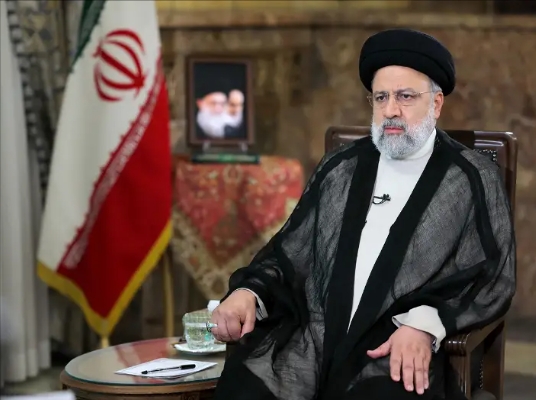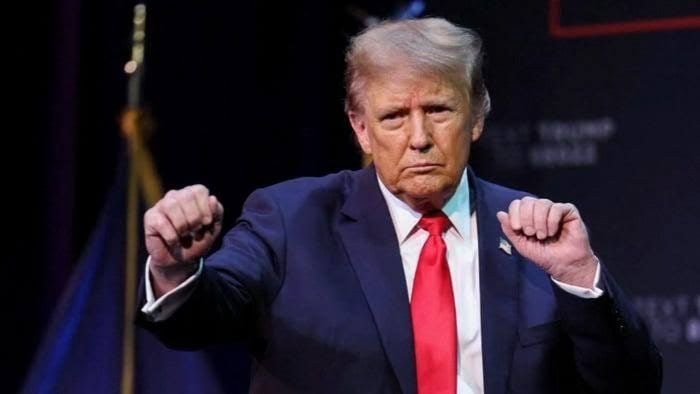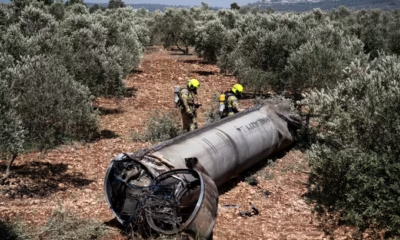Headline
Saudi Arabia, Iraq, Azerbaijan Offer Help To Search President Raisi’s Helicopter

Iranian search and rescue teams were scouring a fog-shrouded mountainside after a helicopter carrying President Ebrahim Raisi went missing in an “accident” on Sunday, state media said.
Fears grew for the 63-year-old ultraconservative after contact was lost with the helicopter carrying him as well as Foreign Minister Hossein Amir-Abdollahian in East Azerbaijan province, reports said.
“An accident happened to the helicopter carrying the president” in the Jolfa region of the western province, state television said, while some officials described the incident as a “hard landing”.
“The harsh weather conditions and heavy fog have made it difficult for the rescue teams to reach the accident site,” said one state broadcaster.
More than 40 rescue teams using search dogs and drones were sent to the site, reported the IRNA news agency.
Raisi was visiting the province where he inaugurated a dam project together with Azerbaijan’s President Ilham Aliyev, on the border between the two countries.
Raisi’s convoy included three helicopters, and the other two had “reached their destination safely,” according to Tasnim news agency.
READ ALSO: Iranian President: Hamas Raises ‘Great Concern’ Over Helicopter Crash
Foreign countries were closely following the search effort at a time of high regional tensions over the Gaza war between Israel and Hamas since October 7 that has drawn in other armed groups in the Middle East.
A US State Department spokesman said: “We are closely following reports of a possible hard landing of a helicopter in Iran carrying the Iranian president and foreign minister.
“We have no further comment at this time.”
An Iranian Red Crescent team was seen walking up a slope in thick fog and drizzling rain, while other live footage showed worshippers reciting prayers in the holy city of Mashhad, Raisi’s hometown.
In neighbouring Iraq, Prime Minister Mohamed Shia al-Sudani “instructed the interior ministry and the Iraqi Red Crescent and other relevant authorities to offer available resources… to aid in the search”.
Azeri President Aliyev said in a post on X that “we were profoundly troubled by the news of a helicopter carrying the top delegation crash-landing in Iran”.
“Our prayers to Allah Almighty are with President Ebrahim Raisi and the accompanying delegation,” he said, noting that his country “stands ready to offer any assistance needed”.
READ ALSO: JUST IN: Helicopter Carrying Iran’s President Crashes
The accident happened in the mountainous protected forest area of Dizmar near the town of Varzaghan, said the official IRNA news agency.
Military personnel along with the Revolutionary Guards and police had also deployed teams to the area, said army chief-of-staff Mohammad Bagheri.
Iran’s Health Minister Bahram Eynollahi said medical resources had been dispatched.
The reformist Shargh daily also reported that “the helicopter carrying the president crashed” while two other helicopters had landed safely.
Interior Minister Ahmad Vahidi said one of the helicopters “made a hard landing due to bad weather conditions” and that it was “difficult to establish communication” with the aircraft.
Raisi has been president of the Islamic Republic since 2021 when he succeeded the moderate Hassan Rouhani, for a term during which Iran has faced crisis and conflict.
READ ALSO: Iran Hangs 53-year-old Woman, Six Others
He took the reins of a country in the grip of a deep social crisis and an economy strained by US sanctions against Tehran over its contested nuclear programme.
Iran saw a wave of mass protests triggered by the death in custody of Iranian-Kurdish woman Mahsa Amini in September 2022 after her arrest for allegedly flouting dress rules for women.
In March 2023, regional rivals Iran and Saudi Arabia signed a surprise deal that restored diplomatic relations.
Saudi Arabia on Sunday voiced “great concern” after Sunday incident, offering to help with the response.
“We affirm that the Kingdom stands by the sisterly Islamic Republic of Iran in these difficult circumstances and its readiness to provide any assistance that the Iranian agencies need,” the foreign ministry of the Gulf kingdom, a longtime rival of Iran, said in a statement.
READ ALSO: Nigerians Knock Seyi Tinubu For Preaching Endurance Over Economic Hardship
The war in Gaza that broke out on October 7 sent regional tensions soaring again and a series of tit-for-tat escalations led to Tehran launching hundreds of missiles and rockets directly at Israel in April 2024.
In a speech following Sunday’s dam inauguration, Raisi emphasised Iran’s support for Palestinians, a centrepiece of its foreign policy since the 1979 Islamic revolution.
“We believe that Palestine is the first issue of the Muslim world, and we are convinced that the people of Iran and Azerbaijan always support the people of Palestine and Gaza and hate the Zionist regime,” said Raisi.
Raisi, born in 1960 in northeast Iran’s holy city of Mashhad, served as Tehran’s prosecutor-general from 1989 to 1994, deputy chief of the Judicial Authority for a decade from 2004, and then national prosecutor-general in 2014.
His black turban signifies direct descent from the Prophet Mohammed, and state media has referred to him by the senior title of ayatollah in the Shiite clerical hierarchy.
Headline
Russia, China Afraid Of US Under My Administration — Trump

United States President, Donald Trump, has said Russia and China fear the United States because of the strength of his administration, arguing that American global influence is driven primarily by its military power and leadership.
Trump, in a post on Truth Social on Wednesday stated that rival powers would not take NATO seriously without the United States, claiming the alliance lacks deterrent force in the absence of American involvement.
He expressed doubts about whether NATO members would come to the aid of the US in a real crisis, despite Washington’s continued commitment to the alliance.
READ ALSO:Trump To Withdraw US From 66 UN, International Organisations
The president credited his leadership with rebuilding the US military during his first term and sustaining its strength, describing this as the key reason adversaries show respect and caution toward the country.
He maintained that America’s military dominance has played a central role in preserving global stability and saving lives.
Trump also argued that his administration forced NATO members to increase defence spending, saying many allies had previously failed to meet financial commitments while relying heavily on the US.
READ ALSO:Insecurity: US Congressman Riley Moore Reveals Trump’s Mission In Nigeria
He added that his actions helped prevent further escalation in Eastern Europe and contributed to the resolution of multiple conflicts.
According to Trump, the United States remains the only nation that commands genuine fear and respect from both Russia and China, a position he attributed to his administration’s approach to defence, diplomacy, and global leadership.
“He wrote partly, “The only Nation that China and Russia fear and respect is the DJT REBUILT U.S.A. MAKE AMERICA GREAT AGAIN!!! President DJT.”
Headline
Trump To Withdraw US From 66 UN, International Organisations

United States President, Donald Trump, has announced plans to withdraw the US from 66 United Nations and international organisations, including key global bodies focused on climate change, peace and democracy.
The decision was disclosed in a presidential memorandum released by the White House on Wednesday evening, following a review of which “organizations, conventions, and treaties are contrary to the interests of the United States.”
According to Trump, the move will see the US end its participation in the affected organisations and cut all related funding.
A list shared by the White House showed that 35 of the organisations are non-UN bodies, including the Intergovernmental Panel on Climate Change (IPCC), the International Institute for Democracy and Electoral Assistance, and the International Union for Conservation of Nature.
READ ALSO:Trump’s Airstrikes: Halt Military Cooperation With US Immediately – Sheikh Gumi Tells Tinubu Govt
Although listed as a non-UN body by the White House, the IPCC is a United Nations organisation that brings together leading scientists to assess climate change evidence and provide periodic reports to guide political leaders.
The memorandum also announced the US withdrawal from 31 UN entities, including the UN Framework Convention on Climate Change (UNFCCC), the UN Democracy Fund, and the UN Population Fund (UNFPA), which focuses on maternal and child health.
Several of the targeted UN bodies are involved in protecting vulnerable groups during armed conflicts, including the UN Office of the Special Representative of the Secretary-General for Children and Armed Conflict.
Reacting to the announcement, UN spokesperson Stephane Dujarric said in a note to correspondents on Wednesday evening that the organisation expected to issue a response by Thursday morning.
Despite repeatedly stating his desire to limit US involvement in UN forums, Trump has continued to exert influence on international decision-making.
READ ALSO:Trump Using FBI To ‘Intimidate’ Congress, US Lawmakers Cry Out
In October last year, he threatened to impose sanctions on diplomats who formally adopted a levy on polluting shipping fuels that had already been agreed to at an earlier meeting, a move that stalled the deal for 12 months.
The Trump administration also sanctioned UN special rapporteur Francesca Albanese after she released a report detailing the role of international and US companies in Israel’s genocidal war on Gaza.
During his first term in 2017, Trump similarly threatened to cut aid to countries that supported a draft UN resolution condemning the US decision to recognise Jerusalem as Israel’s capital.
As a permanent member of the UN Security Council, the US wields significant influence at the United Nations, including veto power, which it has repeatedly used to block efforts to end Israel’s war on Gaza before later mediating a ceasefire.
(Aljazeera)
Headline
UK Supported US Mission To Seize Russian-flagged Oil Tanker – Defense Ministry

The British Ministry of Defence said on Wednesday that it provided support to the United States in its operation to seize a Russian-flagged oil tanker in the North Atlantic.
US seized the tanker, which was being shadowed by a Russian submarine on Wednesday, after pursuing it for more than two weeks across the Atlantic as part of Washington’s efforts to block Venezuelan oil exports.
According to Britain, its armed forces gave pre-planned operational support, including basing following a US request for assistance.
READ ALSO:UK Introduces Powers To Seize Phones, SIM Cards From Illegal Migrants
The UK also said a military vessel provided support for the US forces pursuing the tanker, and the Royal Air Force provided surveillance support from the air.
Defence Secretary John Healey stated that the operation targeted a vessel with a nefarious history linked to Russian and Iranian sanctions evasion networks.
“This action formed part of global efforts to crack down on sanctions busting,” he said in a statement.
READ ALSO:Venezuelan Deportees: US Embassy Gives Reason For Reducing Visa Validity For Nigerians
According to him, the US was Britain’s closest defence and security partner.
“The depth of our defence relationship with the US is an essential part of our security, and today’s seamlessly executed operation shows just how well this works in practice,” he added.
The British government said that the Bella-1 tanker, now renamed Marinera, is sanctioned by the US under its counter-Iran sanctions,
The MoD statement said the support was provided in full compliance with international law.

 News5 days ago
News5 days agoWhat I Saw After A Lady Undressed Herself — Pastor Adeboye

 Headline5 days ago
Headline5 days agoPROPHECY: Primate Ayodele Reveals Trump’s Plot Against Tinubu

 Metro5 days ago
Metro5 days agoArmed Robbers Shot PoS Operator To Death In Edo

 Business3 days ago
Business3 days agoNNPCL Reduces Fuel Price Again

 Metro4 days ago
Metro4 days agoAAU Disowns Students Over Protest

 Metro5 days ago
Metro5 days agoJoint Task Force Kills 23 Bandits Fleeing Kano After Attacks

 Politics5 days ago
Politics5 days ago2027: Rivers APC Pledges To Follow Wike’s Instructions

 Metro4 days ago
Metro4 days agoEdo: Suspected Kidnappers Kill Victim, Hold On To Elder Brother

 Metro4 days ago
Metro4 days agoNine Soldiers Feared Dead In Borno IED Explosion

 Headline2 days ago
Headline2 days agoRussia Deploys Navy To Guard Venezuelan Oil Tanker Chased By US In Atlantic






























